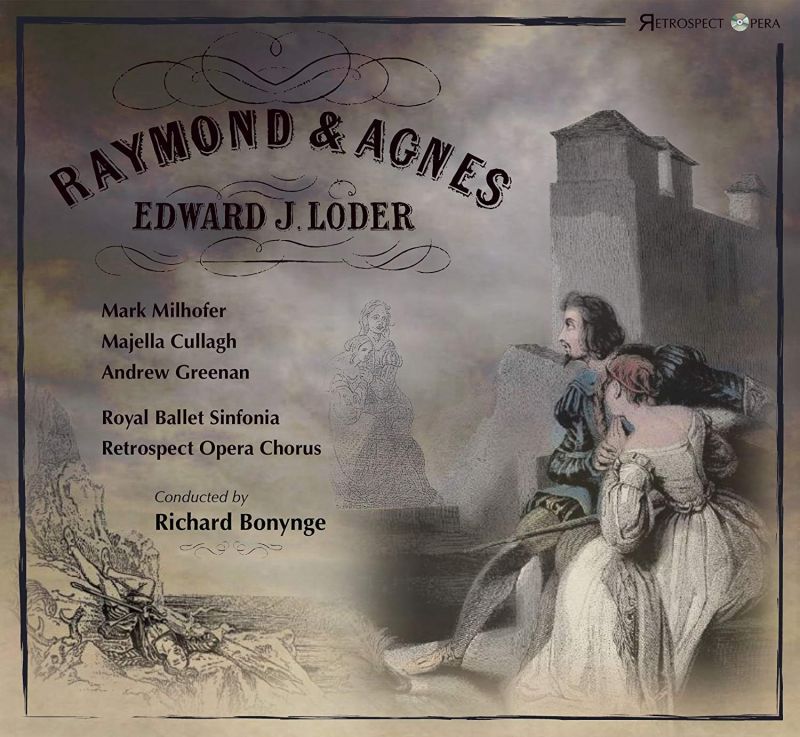LODER Raymond & Agnes (Bonynge)
View record and artist detailsRecord and Artist Details
Composer or Director: Edward James Loder
Genre:
Opera
Label: Retrospect Opera
Magazine Review Date: 10/2018
Media Format: CD or Download
Media Runtime: 149
Mastering:
DDD
Catalogue Number: RO005

Tracks:
| Composition | Artist Credit |
|---|---|
| Raymond and Agnes |
Edward James Loder, Composer
Alessandro Fisher, Theodore, Tenor Alexander Robin Baker, Francesco, Baritone Andrew Greenan, Baron of Lindberg, Bass-baritone Carolyn Dobbin, Madelina, Mezzo soprano Edward James Loder, Composer Majella Cullagh, Agnes, Soprano Mark Milhofer, Raymond, Tenor Quentin Hayes, Antoni, Baritone Retrospect Opera Chorus Richard Bonynge, Conductor Royal Ballet Sinfonia Timothy Langston, Landlord, Tenor |
Author: Andrew Farach-Colton
Raymond and Agnes is based rather loosely on The Monk, Matthew Lewis’s 1796 Gothic novel, with bits of Weber’s Der Freischütz mixed in. The story is so convoluted that I can only give the most cursory summary. The villainous Baron of Lindenberg wants to marry his young ward, Agnes, in order to end a old curse, but Agnes falls in love with Raymond. The lovers plan to elope but their plans are thwarted. Raymond discovers that the Baron was responsible for destroying his family long ago. The Baron’s plan to have Raymond murdered is eventually frustrated and the Baron himself is shot, leaving the young couple free to wed. Oh, and at the end Raymond is reunited with his mute mother, who suddenly regains the ability to speak.
The opera was first performed in Manchester in 1855 and ran for seven performances. An 1859 London production ran for 10, then the work disappeared until 1966, when Nicholas Temperley mounted a critically acclaimed revival in Cambridge (his is one of three excellent scholarly essays included in the booklet). Richard Bonynge, in a prefatory note, admits he was surprised to discover such ‘skilful music’, noting that, if Loder’s gifts as a melodist don’t quite match those of Wallace or Balfe, his dramatic sense is ‘first-rate’ and his orchestration ‘inspired’.
The first number in which I sense Loder’s inspiration taking wing is Raymond’s Act 1 aria ‘Angels roam abroad tonight’, with its ornate, flitting melody and exquisite orchestral colours. Loder lavishes even more care in fleshing out the character of the Baron, who is repentant for his misdeeds but desperate to end the curse through marriage to Agnes. The Baron’s recitative and aria in the first scene of Act 2 reveal his internal struggles in music that seamlessly alternates agitation and aspiration. And, indeed, it’s in Act 2 that Loder’s dramatic grip is most sure. He gradually ratchets up the tension in the confrontation between Raymond and the Baron. There’s a marvellous play of light and shade in the nocturnal second scene, making what could easily have been a drearily clichéd Gothic spook show into something richly atmospheric. This all culminates in the brilliant yet delicate quintet ‘Lost, and in a dream’ – the melodic lines seemingly floating over flickering, candlelit clouds of accompaniment.
The performance is mostly very good. Bonynge is an old hand in this area of the repertory, of course. A few numbers sound under-rehearsed and I occasionally wished for a bit more pep – that bandit’s chorus at the start of Act 3, for example – but the spirit is never in question. As far as the singers go, Mark Milhofer’s Raymond is the standout: sweet-toned, ardent and agile. It’s been more than 20 years since Majella Cullagh recorded the title-role in Wallace’s Maritana and her voice now shows obvious signs of wear. She’s an effective heroine, however, and ably charts Agnes’s development from demure maiden to battle-scarred adult. Andrew Greenan’s tone can be woolly and his legato sometimes leads to ungainliness, but his Baron still commands centre stage.
For anyone with an interest in 19th-century opera, this is a major release. Kudos to Retrospect Opera for putting it all together – and in superb sound, to boot.
Discover the world's largest classical music catalogue with Presto Music.

Gramophone Digital Club
- Digital Edition
- Digital Archive
- Reviews Database
- Full website access
From £8.75 / month
Subscribe
Gramophone Full Club
- Print Edition
- Digital Edition
- Digital Archive
- Reviews Database
- Full website access
From £11.00 / month
Subscribe
If you are a library, university or other organisation that would be interested in an institutional subscription to Gramophone please click here for further information.




